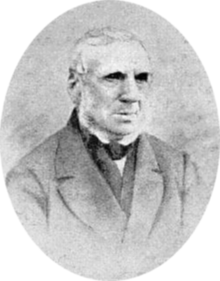James FitzGibbon
| James FitzGibbon | |
|---|---|
 |
|
| Born | 16 November 1780 Glin, County Limerick, Ireland |
| Died | 10 December 1863 (aged 83) London, England |
| Allegiance |
|
| Service/branch | British Army |
| Years of service | 1795 - 1825 |
| Rank | Captain |
| Battles/wars | War of 1812 |
James FitzGibbon (16 November 1780 – 10 December 1863) was a British soldier and hero of the War of 1812.
Born to Garrett (Gerald) FitzGibbon and Mary Widenham in Glin, County Limerick, Ireland, he enlisted in the Knight of Glin's Yeomanry Corps at age 15. Three years later, he joined the Tarbert Infantry Fencibles, an Irish home service regiment, from which he was recruited into the British Army's 49th Regiment of Foot as a private soldier. He first fought in battle in 1799 at Egmond aan Zee, the Netherlands. He later served as a marine in the Battle of Copenhagen, for which he received the Naval General Service Medal.
He went to Canada in 1802, by which time he was a sergeant. He played a key role in the suppression of a near-mutiny at Fort George, Ontario. In 1806, when he was the regiment's Sergeant-Major, his commanding officer, Isaac Brock, made him an officer. This was extremely unusual at the time as most officers' commissions were bought. Later the same year he was appointed regimental adjutant. In 1809, he was promoted to the rank of Lieutenant.
FitzGibbon fought at the Battle of Stoney Creek on 6 June 1813. Three weeks later, he led 50 soldiers in guerrilla-style raids on a large American force that had captured Fort George on the Niagara Peninsula. It was he who was warned by Laura Secord on 22 June about an impending surprise attack by 500 American troops. This led to the Battle of Beaver Dams near present-day Thorold, Ontario, where FitzGibbon's force, together with about 400 Mohawk and Odawa warriors, defeated the Americans and took 462 prisoners. The victory made FitzGibbon a popular hero and he was promoted to Captain in the Glengarry Light Infantry Fencibles.
...
Wikipedia
